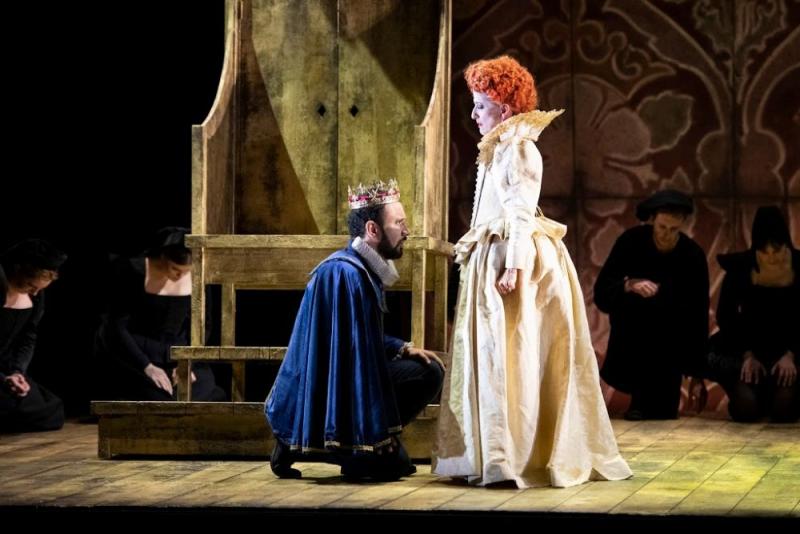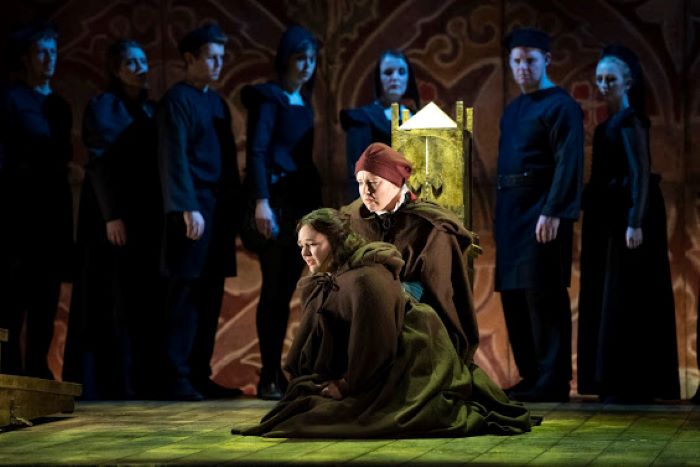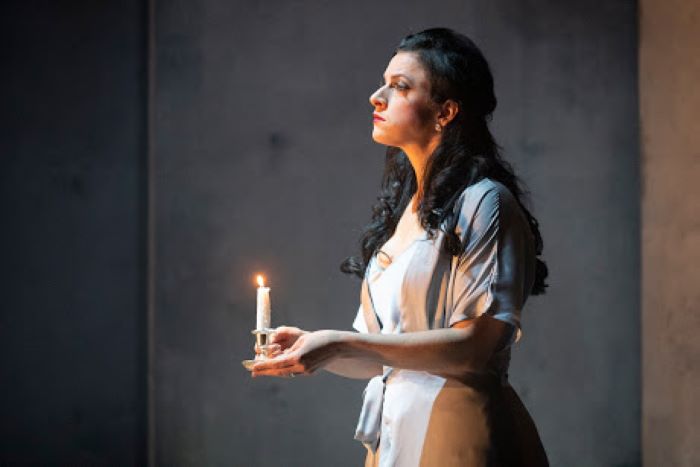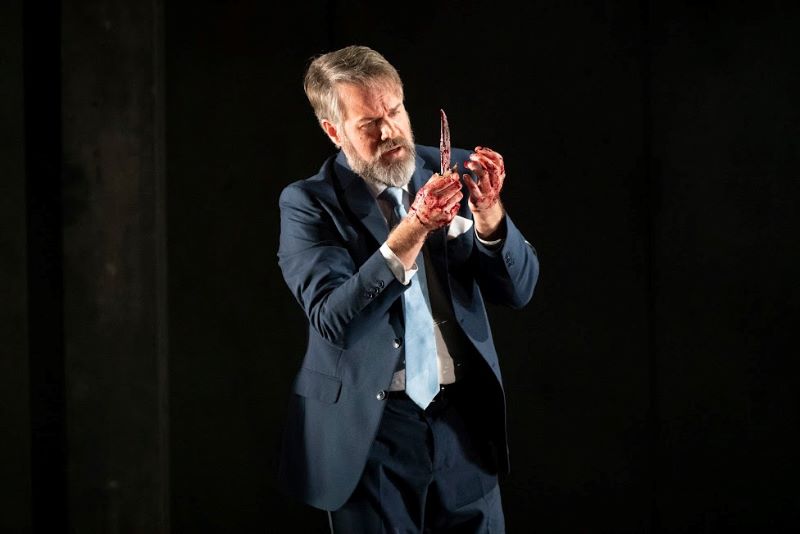Elizabeth I/Macbeth, English Touring Opera review - elegance and eeriness | reviews, news & interviews
Elizabeth I/Macbeth, English Touring Opera review - elegance and eeriness
Elizabeth I/Macbeth, English Touring Opera review - elegance and eeriness
Heroism and horror in a pair of impressive ensemble performances

A crash, a scurry, a long, lilting serenade – the overture to Rossini’s Elizabeth I sounds oddly familiar. Not to worry. English Touring Opera has anticipated our confusion.
Not that James Conway’s production needs much help. A few years ago, ETO staged a pared down but dramatically compelling production of Donizetti’s Anna Bolena that used understated period costumes and a couple of discreet Tudor design elements to evoke an era and create a space for drama without recourse to Zeffirelli style period kitsch. The same applies here; with Conway and his designer Frankie Bradshaw deftly turning the necessary limitations of a touring production into dramatic strengths. An oversized wooden throne embodies both the prestige and the menace of Elizabeth’s power. The chorus, dressed in black, form geometrical patterns on the stage; one moment a crowd of reverent courtiers, the next, the walls of a prison cell.  The music provides any further colour that’s necessary, and for an opera seria, it’s exuberant stuff. With a 36 piece orchestra, there’s no compromise on tone quality, and conductor John Andrews hustles it along: taut, vibrant, irresistibly dashing and aglow with all sorts of delicious orchestral details - little woodwind marches, pairs of clarinets weaving around the coloratura and long cello melodies loping beneath pulsing violins. It’s a reminder of just how fertile and receptive an imagination Rossini possessed; the music that opens Act Two is an absolute ringer for Beethoven’s string quintet Op.29, which – written in 1801 – precedes the opera by a good 14 years.
The music provides any further colour that’s necessary, and for an opera seria, it’s exuberant stuff. With a 36 piece orchestra, there’s no compromise on tone quality, and conductor John Andrews hustles it along: taut, vibrant, irresistibly dashing and aglow with all sorts of delicious orchestral details - little woodwind marches, pairs of clarinets weaving around the coloratura and long cello melodies loping beneath pulsing violins. It’s a reminder of just how fertile and receptive an imagination Rossini possessed; the music that opens Act Two is an absolute ringer for Beethoven’s string quintet Op.29, which – written in 1801 – precedes the opera by a good 14 years.
As for the cast, Mary Plazas makes for a very human Gloriana. Her voice is so warm-textured, and her characterisation so likeable that you do, perhaps, struggle slightly to believe that she truly intends to execute her beloved Earl of Leicester (Luciano Botelho). Splendidly regal when she composes herself, the real fascination of this affecting central performance comes when her voice melts into tenderness, or she shifts uneasily on that massive throne. As sung by Lucy Hall her love-rival Matilde (fatefully, a Stuart) (pictured above), comes across with altogether more steel, dispatching her sprays of outraged high notes with narrow-bore ferocity: a strong musical personality in a frustratingly underwritten role.
Neither of the two male leads quite matched this pair, and perhaps that’s understandable in an opera about a great female leader, though Botelho maintained a troubled dignity as the unhappy Leicester, and launched himself at his massive, ferociously virtuosic Act Two prison aria with a bravura worthy of Beethoven’s Florestan. John-Colyn Gyeantey, as the malevolent Duke of Norfolk, did a good line in hunched Richard Crookback-like brooding and conniving; it would have been nice, however, to have had a little less of the twisted, hollowed out character in his singing, and a little more beauty of tone. There was certainly scope. But as with most ETO productions, this was essentially an ensemble achievement; and all the more impressive for turning a rarity like this into such genuinely compelling entertainment.

Verdi’s Macbeth centres on another powerful woman, who in this production by James Dacre prowls, seduces and finally, chillingly, curls up on a sofa to will her own annihilation. Verdi famously said that he wanted his Lady Macbeth to sound psychologically convincing rather than beautiful, but he’d surely have forgiven Madeleine Pierard (pictured above) for proving that it’s perfectly possible to manage both. She flashed a predatory smile as she placed the crown on her husband’s head, and in La luce langue floated one side of a phrase with icy beauty before letting it curdle and quiver on the way back down. She passed the final test of any singer in this role – the ability to make her mental disintegration evoke pity as well as horror – with frightening tenderness.
Fascinatingly, Grant Doyle as Macbeth (pictured below) traced the opposite vocal trajectory. Relatively pale in his earlier scenes (and especially beside Andrew Slater’s sonorous Banquo), successive moments of crisis seemed to ignite a volcano: a thunderous torrent of tone at the sight of Banquo’s ghost, and a ringing, really heroic resolve – almost a sense of relief – as he faced his violent doom at the hands of Amar Muchhala’s Macduff. And when the king and queen are so right, it’s hard for much else to go wrong with Macbeth.
Staples’s production hit all the story beats with considerable visual style. Using the 1865 version (but omitting the ballet) Staples updated the drama to a contemporary dystopia, with Bradshaw’s designs presenting Dunsinane as a concrete command bunker and Rory Beaton’s lighting generating an oppressive sense of gloom. The male chorus wore camouflage fatigues and toted machine guns while the witches were an order of occult nuns in teal habits; taken together, the choral singing was some of the most powerful I’ve heard from ETO.
 Add conducting from Gerry Cornelius that found an exhilarating tension between lurid brilliance and the eerie, plangent colours of Verdi in supernatural mode (the oboes wailed like mourners in Act Four’s refugee chorus), and it’s hard to know why the audience at Wolverhampton Grand Theatre didn’t applaud a single aria or scene. It was sung in English – a wholly commendable decision, though one to which Verdi more than any other composer seems peculiarly resistant, even in Andrew Porter’s skilful Shakespeare-quoting translation. Possibly the audience (which was of a youth and a diversity that the Royal Opera House can only dream about) were predominantly first timers – though ETO has a long established presence in Wolverhampton. But I don’t see any reason why they shouldn’t simply have been held rapt by the power of the drama: English Touring Opera at the peak of its game, delivering work to rival all but the wealthiest of our big national companies.
Add conducting from Gerry Cornelius that found an exhilarating tension between lurid brilliance and the eerie, plangent colours of Verdi in supernatural mode (the oboes wailed like mourners in Act Four’s refugee chorus), and it’s hard to know why the audience at Wolverhampton Grand Theatre didn’t applaud a single aria or scene. It was sung in English – a wholly commendable decision, though one to which Verdi more than any other composer seems peculiarly resistant, even in Andrew Porter’s skilful Shakespeare-quoting translation. Possibly the audience (which was of a youth and a diversity that the Royal Opera House can only dream about) were predominantly first timers – though ETO has a long established presence in Wolverhampton. But I don’t see any reason why they shouldn’t simply have been held rapt by the power of the drama: English Touring Opera at the peak of its game, delivering work to rival all but the wealthiest of our big national companies.
rating
Explore topics
Share this article
The future of Arts Journalism
You can stop theartsdesk.com closing!
We urgently need financing to survive. Our fundraising drive has thus far raised £49,000 but we need to reach £100,000 or we will be forced to close. Please contribute here: https://gofund.me/c3f6033d
And if you can forward this information to anyone who might assist, we’d be grateful.

Subscribe to theartsdesk.com
Thank you for continuing to read our work on theartsdesk.com. For unlimited access to every article in its entirety, including our archive of more than 15,000 pieces, we're asking for £5 per month or £40 per year. We feel it's a very good deal, and hope you do too.
To take a subscription now simply click here.
And if you're looking for that extra gift for a friend or family member, why not treat them to a theartsdesk.com gift subscription?
more Opera
 Tosca, Welsh National Opera review - a great company reduced to brilliance
The old warhorse made special by the basics
Tosca, Welsh National Opera review - a great company reduced to brilliance
The old warhorse made special by the basics
 BBC Proms: The Marriage of Figaro, Glyndebourne Festival review - merriment and menace
Strong Proms transfer for a robust and affecting show
BBC Proms: The Marriage of Figaro, Glyndebourne Festival review - merriment and menace
Strong Proms transfer for a robust and affecting show
 BBC Proms: Suor Angelica, LSO, Pappano review - earthly passion, heavenly grief
A Sister to remember blesses Puccini's convent tragedy
BBC Proms: Suor Angelica, LSO, Pappano review - earthly passion, heavenly grief
A Sister to remember blesses Puccini's convent tragedy
 Orpheus and Eurydice, Opera Queensland/SCO, Edinburgh International Festival 2025 review - dazzling, but distracting
Eye-popping acrobatics don’t always assist in Gluck’s quest for operatic truth
Orpheus and Eurydice, Opera Queensland/SCO, Edinburgh International Festival 2025 review - dazzling, but distracting
Eye-popping acrobatics don’t always assist in Gluck’s quest for operatic truth
 MARS, Irish National Opera review - silly space oddity with fun stretches
Cast, orchestra and production give Jennifer Walshe’s bold collage their all
MARS, Irish National Opera review - silly space oddity with fun stretches
Cast, orchestra and production give Jennifer Walshe’s bold collage their all
 Káťa Kabanová, Glyndebourne review - emotional concentration in a salle modulable
Janáček superbly done through or in spite of the symbolism
Káťa Kabanová, Glyndebourne review - emotional concentration in a salle modulable
Janáček superbly done through or in spite of the symbolism
 Buxton International Festival 2025 review - a lavish offering of smaller-scale work
Allison Cook stands out in a fascinating integrated double bill of Bernstein and Poulenc
Buxton International Festival 2025 review - a lavish offering of smaller-scale work
Allison Cook stands out in a fascinating integrated double bill of Bernstein and Poulenc
 Tosca, Clonter Opera review - beauty and integrity in miniature
Happy surprises and a convincing interpretation of Puccini for today
Tosca, Clonter Opera review - beauty and integrity in miniature
Happy surprises and a convincing interpretation of Puccini for today
 Hamlet, Buxton International Festival review - how to re-imagine re-imagined Shakespeare
Music comes first in very 19th century, very Romantic, very French operatic creation
Hamlet, Buxton International Festival review - how to re-imagine re-imagined Shakespeare
Music comes first in very 19th century, very Romantic, very French operatic creation
 Falstaff, Glyndebourne review - knockabout and nostalgia in postwar Windsor
A fat knight to remember, and snappy stagecraft, overcome some tedious waits
Falstaff, Glyndebourne review - knockabout and nostalgia in postwar Windsor
A fat knight to remember, and snappy stagecraft, overcome some tedious waits
 Salome, LSO, Pappano, Barbican review - a partnership in a million
Asmik Grigorian is vocal perfection in league with a great conductor and orchestra
Salome, LSO, Pappano, Barbican review - a partnership in a million
Asmik Grigorian is vocal perfection in league with a great conductor and orchestra
 Semele, Royal Opera review - unholy smoke
Style comes and goes in a justifiably dark treatment of Handelian myth
Semele, Royal Opera review - unholy smoke
Style comes and goes in a justifiably dark treatment of Handelian myth

Add comment